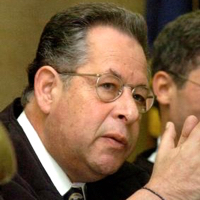Rascals case in brief
In the beginning, in 1989, more than 90 children at the Little Rascals Day Care Center in Edenton, North Carolina, accused a total of 20 adults with 429 instances of sexual abuse over a three-year period. It may have all begun with one parent’s complaint about punishment given her child.
Among the alleged perpetrators: the sheriff and mayor. But prosecutors would charge only Robin Byrum, Darlene Harris, Elizabeth “Betsy” Kelly, Robert “Bob” Kelly, Willard Scott Privott, Shelley Stone and Dawn Wilson – the Edenton 7.
Along with sodomy and beatings, allegations included a baby killed with a handgun, a child being hung upside down from a tree and being set on fire and countless other fantastic incidents involving spaceships, hot air balloons, pirate ships and trained sharks.
By the time prosecutors dropped the last charges in 1997, Little Rascals had become North Carolina’s longest and most costly criminal trial. Prosecutors kept defendants jailed in hopes at least one would turn against their supposed co-conspirators. Remarkably, none did. Another shameful record: Five defendants had to wait longer to face their accusers in court than anyone else in North Carolina history.
Between 1991 and 1997, Ofra Bikel produced three extraordinary episodes on the Little Rascals case for the PBS series “Frontline.” Although “Innocence Lost” did not deter prosecutors, it exposed their tactics and fostered nationwide skepticism and dismay.
With each passing year, the absurdity of the Little Rascals charges has become more obvious. But no admission of error has ever come from prosecutors, police, interviewers or parents. This site is devoted to the issues raised by this case.
On Facebook
Click for earlier Facebook posts archived on this site
Click to go to
Today’s random selection from the Little Rascals Day Care archives….
Click for earlier Facebook posts archived on this site
Click to go to
Today’s random selection from the Little Rascals Day Care archives….
Prosecutor believed he had closed the deal early on
March 22, 2013
“’There are some people who said we could have stopped after the first child testified.”
– District Attorney H.P. Williams Jr., expressing confidence that the jury was being persuaded by the state’s stream of child-witnesses against Bob Kelly, The Associated Press, Dec. 9, 1991
Professional child abuse: Creating false memories
Dec. 5, 2011
In this (Nov. 29) New York Times analysis of science’s ever-growing skepticism about eyewitness testimony I noticed a familiar name:
 “One of the earliest and more famous experiments to demonstrate that memories are malleable was conducted by Elizabeth Loftus, a psychology professor at the University of California, Irvine, and an early pioneer of witness memory research.
“One of the earliest and more famous experiments to demonstrate that memories are malleable was conducted by Elizabeth Loftus, a psychology professor at the University of California, Irvine, and an early pioneer of witness memory research.
“In a 1974 study published in The Journal of Verbal Learning and Verbal Behavior, (Loftus) asked participants to view films of fender-benders in which no car windows or headlights were broken. Later, the subjects who were asked how fast the cars were going when they ‘smashed’ into each other – as opposed to ‘hit’ – were more likely to report speeding and describe shattered glass they never actually saw.”
While researching a book on the Wenatchee, Washington, ritual sex abuse case (1994-95), Kathryn Lyon asked Loftus about the consequences when professionals contribute to and reinforce false memories in children.
“If you believe real child abuse has long-term deleterious consequences,” Loftus responded, “then what happens when you create a false memory of child abuse? Are you creating a victim who is also likely to have long-term troubles?
“Having a real and a pseudo memory are in many ways the same. If you create the memory, are you not creating child abuse?”
Lyon, a lawyer, spent a year in Wenatchee to write the thorough and chilling “Witch Hunt: A True Story of Social Hysteria and Abused Justice” (1998).
Retraction won’t kill you, journal editors
June 7, 2013
“One hundred and fifty-five years after it snubbed Dr. John Snow in his obituary, The Lancet is taking it back.
“The British medical journal noted that its original obituary – published June 26, 1858 – failed to mention his “remarkable achievements” in epidemiology, especially his research on the way cholera is spread….
“It’s not the first time a publication has issued a correction for work published decades ago. The New York Times corrected a 26-year-old error about horse-drawn carriages in Central Park in 2011, and once retracted a 1920 editorial that claimed space travel was impossible.”
– From “The Lancet Corrects Obituary For John Snow Published 155 Years Ago” in the Huffington Post (April 12)
If The Lancet and The New York Times can reach back in their archives to right the record, why can’t Journal of Child and Youth Care, Child Abuse & Neglect and Nursing Research?
Retirement looms for Rubenstein, who detected scam

phillyburbs.com
Judge Alan Rubenstein
Feb. 26, 2016
“What a waste it would be to force Bucks County (Pa.) Judge Alan Rubenstein from the bench. At 70, he remains sharp and vibrant, a jurist of impeccable credentials with vast institutional knowledge of Bucks County, not to mention historic accomplishments.
“As district attorney, Rubenstein tried more cases than any prosecutor in county history. And he was the only county DA to be elected four times, a measure of how well he did the job and how much voters trusted and appreciated him. Indeed, they rewarded him with a seat on the county bench, a post Rubenstein continues to relish and is in no hurry to relinquish.
“Yet, Rubenstein and every judge across the state faces mandatory retirement at age 70… unless voters extend the mandatory retirement age (to 75)….”
– From “Sound judgment: Too soon to retire,” editorial in the Bucks County Courier Times (Feb. 23) cached here
“No tribute to Judge Alan Rubenstein is complete without mentioning his wise and courageous decision not to pursue charges in the Breezy Point Day School case in 1990…. Countless other prosecutors across the nation fell hard for the ‘satanic ritual abuse’ moral panic, but Judge Rubenstein kept his head, investigated thoroughly and protected Bucks County from the nightmare that befell towns such as Manhattan Beach, Calif., and Edenton, N.C.”
— From my letter to the editor of the Courier Times (Feb. 26)
Unless Pennsylvania voters approve that referendum on the April 26 ballot, Rubenstein’s valuable service will be limited to fill-in duty.
Some septuagenarian judges, of course, should stay retired.
![]()











0 CommentsComment on Facebook